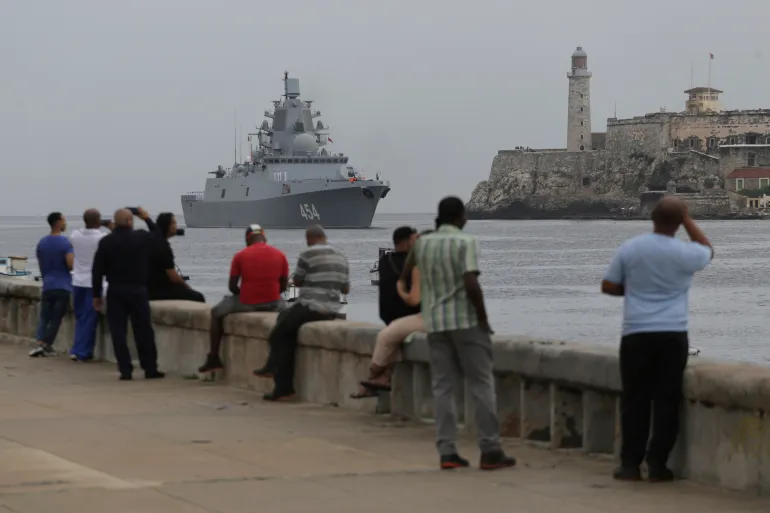In a development that has captured global attention, a Russian Navy submarine recently docked in Cuba, rekindling Cold War-era tensions and raising questions about the shifting dynamics of international relations. This strategic maneuver not only reflects Russia’s desire to assert its influence in the Western Hemisphere but also underscores the broader geopolitical implications of military partnerships and naval deployments.
Historical Context of Russian-Cuban Relations
The presence of a Russian submarine in Cuba is a potent reminder of the historical ties between the two nations. During the Cold War, Cuba was a significant ally of the Soviet Union, providing a critical strategic position in the Caribbean. The Cuban Missile Crisis of 1962, which brought the world to the brink of nuclear war, was a direct result of Soviet military presence on the island. Following the dissolution of the Soviet Union, relations between Russia and Cuba experienced a period of decline, but recent years have seen a revival of this partnership.
The resurgence of military cooperation between Russia and Cuba, marked by the recent submarine deployment, reflects a strategic effort by Russia to reestablish its presence in the region. This move aligns with broader Russian objectives to counterbalance U.S. influence and assert its role as a global power.
The Submarine’s Arrival and Its Implications
The arrival of the Russian submarine in Cuba was a highly anticipated event, closely monitored by international observers and military analysts. The submarine, which docked at Havana’s port, is part of a broader strategy by Russia to project its naval capabilities and reinforce its geopolitical standing.
The deployment of the submarine serves several strategic purposes:
- Demonstration of Power: The presence of a Russian submarine in Cuban waters sends a clear signal of Russia’s military capabilities and its intention to operate in the Western Hemisphere. This move is seen as a direct challenge to U.S. dominance in the region and a demonstration of Russia’s ability to project power beyond its traditional sphere of influence.
- Strengthening Alliances: The submarine’s visit underscores the strengthening of military ties between Russia and Cuba. By engaging in joint exercises and fostering closer defense cooperation, both nations aim to bolster their strategic relationship and enhance their mutual security interests.
- Regional Influence: Russia’s military presence in Cuba allows it to extend its influence in the Caribbean and Latin America. This presence provides Russia with a foothold in a region traditionally under U.S. influence, further complicating the geopolitical landscape and highlighting the shifting balance of power.
Geopolitical Reactions and Concerns
The deployment of a Russian submarine in Cuba has elicited a range of reactions from global actors, particularly the United States. U.S. officials have expressed concerns about the strategic implications of this move, viewing it as a provocative action that challenges American hegemony in the region.
The presence of the submarine has prompted a reassessment of U.S. naval strategy and regional security policies. Analysts have speculated that the U.S. may need to enhance its own naval presence and increase intelligence efforts to monitor and respond to Russian activities in the Caribbean.
The broader geopolitical implications of the submarine’s visit are also significant. It reflects the ongoing competition between major powers for influence and strategic advantage. The revival of Cold War-era tactics and alliances highlights the complex and evolving nature of international relations in the 21st century.
The Role of Military Diplomacy and Cooperation
The visit of the Russian submarine also underscores the importance of military diplomacy and international cooperation. While the submarine’s arrival may be seen as a provocative gesture, it also reflects the broader context of military engagement and collaboration between nations.
Military diplomacy plays a crucial role in shaping international relations and managing conflicts. Through joint exercises, strategic partnerships, and diplomatic negotiations, nations seek to enhance mutual understanding and address security challenges. The cooperation between Russia and Cuba exemplifies the ways in which military relationships can influence global dynamics and contribute to strategic objectives.
Future Prospects and Strategic Considerations
Looking ahead, the presence of the Russian submarine in Cuba will likely continue to shape the geopolitical landscape. The immediate impact of the submarine’s visit will depend on how it is perceived and responded to by other global actors.
For Russia and Cuba, the submarine’s visit represents a significant step in strengthening their strategic partnership and asserting their presence in the Caribbean. The continuation of military cooperation and joint activities will be closely watched by international observers and could influence future diplomatic and security policies.
For the United States and its allies, the arrival of the submarine highlights the need for vigilance and strategic planning. Enhancing naval capabilities, improving intelligence efforts, and engaging in diplomatic initiatives will be key components of managing the evolving geopolitical environment.
Conclusion
The arrival of a Russian Navy submarine in Cuba marks a notable development in international relations, reflecting the ongoing complexities and tensions of global geopolitics. As a symbol of Russia’s strategic ambitions and a reminder of Cold War-era alliances, the submarine’s visit underscores the need for careful management and response from all involved parties. The broader implications of this event will continue to unfold, shaping the future of regional and global security dynamics.
